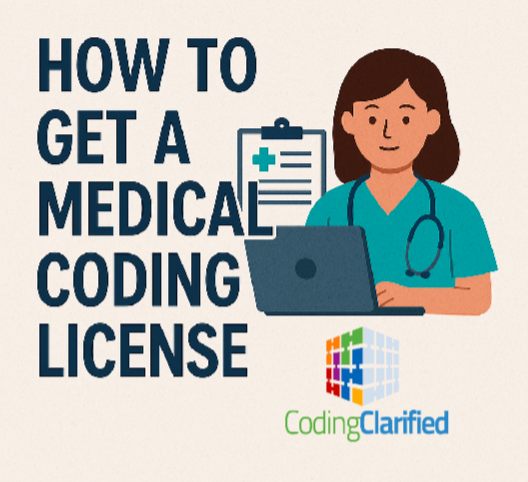How to Get a Medical Coding License: A Step-by-Step Guide
Medical coding is a crucial part of the healthcare system, transforming patient diagnoses and procedures into standardized codes used for billing, data analysis, and insurance claims. If you’re interested in pursuing a career in this high-demand field, obtaining a medical coding license or certification is a key step. Here’s how to get a medical coding license.
Understand the Difference: License vs. Certification
In the U.S., medical coders do not need a government-issued “license” to practice. Instead, most employers require certification from a recognized organization. Think of certification as your professional credential proving you have the knowledge and skills to code accurately.
Top certifying bodies include:
-
AAPC (American Academy of Professional Coders)
-
AHIMA (American Health Information Management Association)
Comparing AHIMA vs AAPC Certifications for Medical Coders https://codingclarified.com/comparing-aapc-and-ahima-certifications-for-medical-coders/
Comparing AHIMA vs AAPC Certifications for Medical Coders https://codingclarified.com/comparing-aapc-and-ahima-certifications-for-medical-coders/
Choose the Right Certification for Your Goals
There are several certifications depending on your interests and career path:
-
CPC (Certified Professional Coder) – offered by AAPC, ideal for outpatient coding.
-
CCA (Certified Coding Associate) – offered by AHIMA, a good entry-level certification.
-
CCS (Certified Coding Specialist) – also from AHIMA, for advanced coders with inpatient knowledge.
-
COC, CIC, CRC – specialized AAPC certifications for facility, inpatient, or risk adjustment coding.
Enroll in a Medical Coding Education Program
Although not always required, formal education is highly recommended. You can pursue:
-
Online or in-person training programs
-
Coding certificate programs from community colleges
-
AAPC or AHIMA-approved training courses
Programs typically cover:
-
ICD-10-CM, CPT®, HCPCS Level II
-
Medical terminology and anatomy
-
Healthcare reimbursement methods
Coding Clarified
Medical Coding course includes the following:
Access to the online medical coding course using the AAPC-approved curriculum
CPT, ICD10, HCPC, Workbook & Textbook
Instructor audio/video files for each chapter to implement notes into your manuals
1:1 time with instructor as needed
Professionally written resume
AAPC Membership
CPC Exam Voucher
Job placement assistance/resources
Online HCC Internship
Free 50-Question Practice Exam
Practicode
https://codingclarified.com/mastering-online-medical-coding-training/
Gain Practical Experience (if possible)
Hands-on experience can give you an edge. Some certifications (like CCS) require prior experience or completion of a program. Consider:
-
Internships
-
Volunteer positions at clinics
-
Practicum courses in training programs
AAPC Practicode https://www.aapc.com/practicode/practicode-modules.aspx
Register and Pass the Certification Exam
Once you’re ready:
-
Choose your exam (CPC, CCS, etc.)
-
Schedule your exam through AAPC or AHIMA
-
Study with official guides, practice exams, and online communities
Exam tips:
-
Time management is crucial
-
Know your codebooks well
-
Take multiple practice tests
Coding Clarified CPC Exam Tips https://codingclarified.com/tips-to-pass-the-aapc-cpc-exam/
Choosing the Correct AAPC CPC Exam Format for You FAQs https://codingclarified.com/taking-the-aapc-cpc-exam-format-faqs/
Are you prepared for the AAPC CPC Exam https://codingclarified.com/prepared-for-aapc-cpc-exam/
Maintain Your Credential
Most certifications require:
-
Continuing Education Units (CEUs)
-
Membership renewal (e.g., AAPC’s annual membership)
This ensures you stay updated on coding guidelines and healthcare regulations.
Maintain your CPC with CEU https://codingclarified.com/maintaining-your-cpc-credential-with-ceu/
Although there’s no government-issued “medical coding license,” earning a professional certification is your ticket to a rewarding career in healthcare. With the right preparation and dedication, you can become a certified medical coder and start working in clinics, hospitals, insurance companies, or even remotely.

